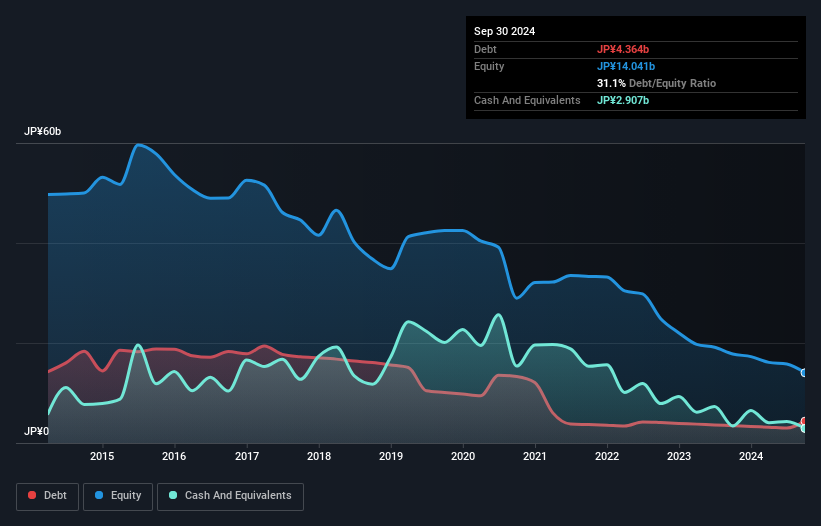Would Senshukai (TSE:8165) Be Better Off With Less Debt?

Some say volatility, rather than debt, is the best way to think about risk as an investor, but Warren Buffett famously said that 'Volatility is far from synonymous with risk.' So it might be obvious that you need to consider debt, when you think about how risky any given stock is, because too much debt can sink a company. We note that Senshukai Co., Ltd. (TSE:8165) does have debt on its balance sheet. But the more important question is: how much risk is that debt creating?
When Is Debt A Problem?
Debt assists a business until the business has trouble paying it off, either with new capital or with free cash flow. Ultimately, if the company can't fulfill its legal obligations to repay debt, shareholders could walk away with nothing. While that is not too common, we often do see indebted companies permanently diluting shareholders because lenders force them to raise capital at a distressed price. Having said that, the most common situation is where a company manages its debt reasonably well - and to its own advantage. When we think about a company's use of debt, we first look at cash and debt together.
Check out our latest analysis for Senshukai
What Is Senshukai's Net Debt?
You can click the graphic below for the historical numbers, but it shows that as of September 2024 Senshukai had JP¥4.36b of debt, an increase on JP¥3.47b, over one year. On the flip side, it has JP¥2.91b in cash leading to net debt of about JP¥1.46b.

How Strong Is Senshukai's Balance Sheet?
We can see from the most recent balance sheet that Senshukai had liabilities of JP¥10.3b falling due within a year, and liabilities of JP¥2.42b due beyond that. Offsetting these obligations, it had cash of JP¥2.91b as well as receivables valued at JP¥3.73b due within 12 months. So its liabilities total JP¥6.06b more than the combination of its cash and short-term receivables.
This deficit isn't so bad because Senshukai is worth JP¥11.6b, and thus could probably raise enough capital to shore up its balance sheet, if the need arose. But we definitely want to keep our eyes open to indications that its debt is bringing too much risk. When analysing debt levels, the balance sheet is the obvious place to start. But you can't view debt in total isolation; since Senshukai will need earnings to service that debt. So when considering debt, it's definitely worth looking at the earnings trend. Click here for an interactive snapshot.
Over 12 months, Senshukai made a loss at the EBIT level, and saw its revenue drop to JP¥45b, which is a fall of 14%. That's not what we would hope to see.
Caveat Emptor
Not only did Senshukai's revenue slip over the last twelve months, but it also produced negative earnings before interest and tax (EBIT). Indeed, it lost a very considerable JP¥3.9b at the EBIT level. When we look at that and recall the liabilities on its balance sheet, relative to cash, it seems unwise to us for the company to have any debt. So we think its balance sheet is a little strained, though not beyond repair. However, it doesn't help that it burned through JP¥5.0b of cash over the last year. So in short it's a really risky stock. The balance sheet is clearly the area to focus on when you are analysing debt. However, not all investment risk resides within the balance sheet - far from it. To that end, you should learn about the 3 warning signs we've spotted with Senshukai (including 2 which are significant) .
When all is said and done, sometimes its easier to focus on companies that don't even need debt. Readers can access a list of growth stocks with zero net debt 100% free, right now.
New: Manage All Your Stock Portfolios in One Place
We've created the ultimate portfolio companion for stock investors, and it's free.
• Connect an unlimited number of Portfolios and see your total in one currency
• Be alerted to new Warning Signs or Risks via email or mobile
• Track the Fair Value of your stocks
Have feedback on this article? Concerned about the content? Get in touch with us directly. Alternatively, email editorial-team (at) simplywallst.com.
This article by Simply Wall St is general in nature. We provide commentary based on historical data and analyst forecasts only using an unbiased methodology and our articles are not intended to be financial advice. It does not constitute a recommendation to buy or sell any stock, and does not take account of your objectives, or your financial situation. We aim to bring you long-term focused analysis driven by fundamental data. Note that our analysis may not factor in the latest price-sensitive company announcements or qualitative material. Simply Wall St has no position in any stocks mentioned.
About TSE:8165
Senshukai
Engages in the mail order, corporate, and insurance businesses in Japan.
Excellent balance sheet and slightly overvalued.
Market Insights
Community Narratives



